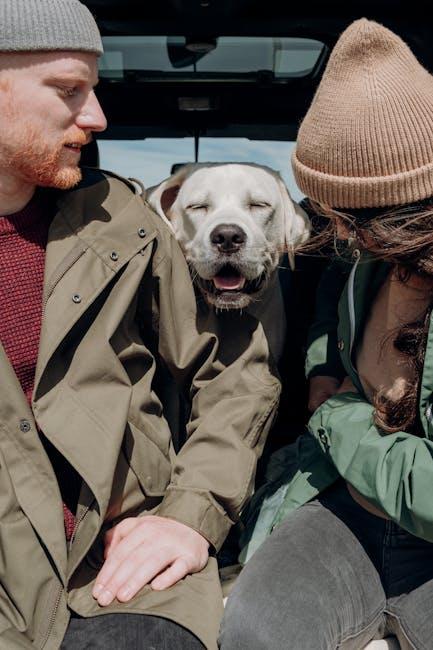Hey there, fellow pet lovers! 🐾 Planning a getaway and can’t bear the thought of leaving your furry friend behind? You’re not alone! Traveling with pets can be one of the most rewarding experiences, but before you hit the road (or take to the skies), there’s one important document you absolutely can’t forget: the health certificate. Trust us, this little piece of paper can save you a whole lot of hassle and heartache! In this guide, we’ll dive into why a health certificate is essential for pet travel, what it includes, and how to snag one for your best buddy. So grab your pup’s favorite toy, settle in, and let’s get you both ready for an adventure! 🐶✈️
Understanding the Importance of a Health Certificate for Your Furry Friend
Traveling with your pet can sometimes feel like a whirlwind adventure filled with excitement. However, to ensure a smooth journey, understanding the significance of a health certificate is essential. This document provides proof that your furry friend is free from contagious diseases and is up-to-date on vaccinations, safeguarding both your pet and other animals they may encounter. Depending on your destination, a health certificate could be required by airlines, hotels, or even certain states and countries, making it a vital part of your travel preparations. Not only does it facilitate easy movement, but it also gives you peace of mind knowing that your companion is in top shape for the trip.
Obtaining a health certificate involves a speedy visit to your veterinarian, who will assess your pet’s health and issue the necessary documentation. Here are some key points to consider:
- Timing: Health certificates are typically valid for a limited period, often ranging from 10 to 30 days, based on travel regulations.
- Specific Requirements: Different destinations have their own set of health regulations, so be sure to check what documentation is needed in advance.
- Cost: While fees may vary by veterinarian, presenting your pet for a health check is a small price to pay for safe travels.
To give you a clearer picture, here’s a quick overview of standard requirements for health certificates:
| Destination | Common Requirements |
|---|---|
| United States | Rabies vaccination proof, health check within 30 days |
| Canada | Rabies vaccine certificate, import permit for certain breeds |
| Europe | Microchip ID, rabies shot, tapeworm treatment for some countries |

What to Expect during Your Pet’s Health Checkup
Taking your furry friend for a health checkup can feel a bit daunting, but it’s a crucial part of their overall well-being.During the appointment, your veterinarian will start with a thorough examination that checks various aspects of your pet’s health. Expect them to:
- Listen to your pet’s heart and lungs
- Check eyes and ears for any irregularities
- Examine teeth and gums
- Look over the skin and coat for any issues
- weigh your pet and assess their body condition
Additionally, your vet might recommend some routine tests to gain more insight into your pet’s health status. This could include blood work, stool samples, or even vaccinations if they are due.It’s also the perfect opportunity to discuss any behavioral changes or concerns you may have noticed. Be sure to take notes or ask questions about:
- Dietary needs and recommendations
- Preventive care options,like flea and tick medication
- Exercise suggestions tailored to your pet’s age and lifestyle

Navigating the Paperwork: Tips for Obtaining Your Health Certificate
Getting your hands on that coveted health certificate can feel like a daunting task, but with a bit of organization and foresight, it doesn’t have to be! Frist things first, research the requirements: different countries and airlines have various rules, so jot down the necessary vaccinations and health checks specific to your destination. Consult your vet early in the process, as they will guide you on the required tests and vaccinations. Since many of these vaccinations must be administered weeks in advance, start early to ensure you meet all deadlines without a last-minute scramble!
Next up, prepare your documentation. You’ll want to gather all the essential paperwork, such as vaccination records and any previous health certificates. It might very well be super helpful to create a checklist to keep track of what you have and what you still need. Also, don’t forget about copies—having backup documents can save you from headaches down the line. If your travel plans include multiple stops, consider contacting your airline for any specific forms they might require. Here’s a handy table summarizing key steps:
| Step | Details |
|---|---|
| research Requirements | Check destination-specific vaccinations and tests. |
| Consult Your Vet | Schedule an appointment to discuss necessary health checks. |
| Prepare Documentation | Gather records, certificates, and ensure you have copies. |
| Contact Airline | Ask if any specific forms or additional paperwork is needed. |

traveling with Pets Made Easy: Best Practices and Essential Supplies
Traveling with your furry friends doesn’t have to be a hassle, especially when you’re armed with the right knowlege and supplies. To make the journey smoother, start by planning your route to include pet-friendly stops. Always check if your accommodations welcome pets and make reservations in advance. Additionally, consider bringing along a travel kit that includes the essentials like food and water bowls, leashes, waste bags, and familiar toys to keep your pet comfortable on the road. A cozy blanket featuring their scent can ease anxiety and help them feel secure in new environments.
Another critical aspect of pet travel is health preparedness. A health certificate is not just a piece of paper; it’s a ticket to ensuring your pet’s well-being. Many states and countries require this documentation before entry, stating your pet is healthy and free from contagious diseases. Remember to consult your veterinarian for the necessary vaccinations and examinations, as they will issue the certificate. Keep an eye on the expiration date as well; these certificates often have a limited validity. Here’s a quick look at essential vaccinations often included in health certificates:
| Vaccination | Recommended For |
|---|---|
| Rabies | Dogs, cats |
| DHLPP | Dogs |
| FVRCP | Cats |
| bordetella | Dogs (in kennel settings) |
Q&A
Your Guide to Pet travel: Why You Need a Health Certificate
Q: What’s a health certificate for pets?
A: A health certificate is like a little passport for your furry friend! It’s an official document from a veterinarian that states your pet is healthy, up to date on vaccinations, and free from contagious diseases. This certificate is crucial when you’re traveling, especially across state lines or internationally.
Q: Why do I need a health certificate to travel with my pet?
A: Just like we have our own travel documents, pets need theirs to! Many airlines, states, and countries require a health certificate to ensure that pets don’t bring any illnesses along for the ride. It helps protect your pet and other animals, so it’s a win-win. Plus,having this paperwork can save a lot of hassle and headaches on your journey!
Q: When should I get the health certificate?
A: You’ll want to schedule a visit to the vet about 10-14 days before your trip. This timeline is key as most health certificates are valid for a limited period (usually around 10 days), so you want to make sure it’s fresh for your travels but not so last-minute that you risk any surprises.
Q: What does my vet check during the examination?
A: Your vet will do a full check-up to ensure your pet is healthy and fit for travel. They’ll look for signs of illness, check vaccination records, and may also perform tests for certain diseases depending on where you’re headed. Don’t worry; it’s usually a quick and easy process!
Q: Can I travel without a health certificate?
A: Technically, yes, you might be able to, but it’s a gamble! Many airlines and destinations strictly require it, and showing up without one can lead to delays, extra costs, or even being denied entry. so, to keep your trip smooth and stress-free, definitely get the certificate!
Q: Are there any special rules for international travel?
A: Oh, absolutely! International pet travel can be a whole different ballgame. Each country has its own guidelines, and many require more than just a health certificate, like vaccinations specific to that destination or even a rabies titer test. Be sure to do your homework ahead of time and check the regulations of the country you’re visiting.
Q: what if my pet has a pre-existing condition?
A: If your pet has a health issue, don’t panic! Just be upfront with your vet about it. They can assess whether your pet is still fit for travel and advise you on any additional steps or precautions you might need to take. Your pet’s health and safety come first!
Q: How can I make the process easier?
A: Here are a few tips:
- Plan ahead: Don’t leave the health certificate to the last minute.
- Keep records handy: Have your pet’s vaccination history and any prior health certificates available.
- Consult your veterinarian: They can walk you through the requirements and help you with the paperwork.
Q: Any final advice for pet travelers?
A: Just remember to keep your pet’s comfort in mind! Travel can be stressful for them, so make sure to pack their favorite toys, bring plenty of water, and take breaks during your journey. The health certificate is just one part of the puzzle, but it helps ensure your trip is a tail-wagging success! Happy travels! 🐾✈️
To Wrap It Up
And there you have it—your complete guide to pet travel and the all-important health certificate! We no your furry friends are family, and just like you wouldn’t set off on an adventure without packing your essentials, neither should they. A health certificate may seem like just another piece of paper, but it’s your ticket to smoother travels and peace of mind.So, whether you’re planning a cross-country road trip or hopping on a plane to a sunny beach, make sure your pet is well-prepped and paperwork is in hand. And remember, a little preparation goes a long way in ensuring you and your pet have a fantastic trip full of memories (and maybe a few silly selfies along the way).
Got any tips or funny travel stories with your pets? We’d love to hear them! Until next time, happy travels with your four-legged companions! 🐾✈️











